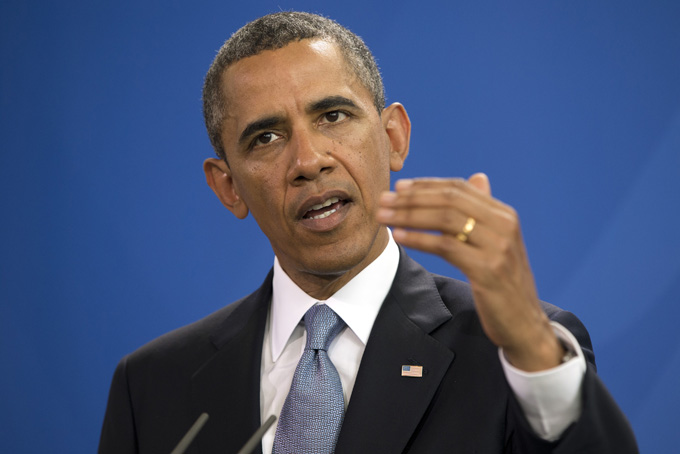
PRESIDENT BARACK OBAMA (AP Photo/Evan Vucci, File)
WASHINGTON (NNPA) – President Obama has pledged that his administration will do “everything in its power” to repair the damage done by the United States Supreme Court on Tuesday when it struck down a key provision of the 1965 Voting Rights Act.
“I am deeply disappointed with the Supreme Court’s decision today,” he said in a statement. “For nearly 50 years, the Voting Rights Act – enacted and repeatedly renewed by wide bipartisan majorities in Congress – has helped secure the right to vote for millions of Americans. Today’s decision invalidating one of its core provisions upsets decades of well-established practices that help make sure voting is fair, especially in places where voting discrimination has been historically prevalent.”
The president continued, “As a nation, we’ve made a great deal of progress towards guaranteeing every American the right to vote. But, as the Supreme Court recognized, voting discrimination still exists. And while today’s decision is a setback, it doesn’t represent the end of our efforts to end voting discrimination. I am calling on Congress to pass legislation to ensure every American has equal access to the polls. My Administration will continue to do everything in its power to ensure a fair and equal voting process.”
A sharply divided Supreme Court upheld the legality of the 1965 Voting Rights Act, but said it can’t be enforced until Congress updates the way it determines which jurisdictions are covered under Section 5, the provision that requires preclearance by the Justice Department or a federal court before changes to local voting laws can be implemented.
The 5-4 decision by the conservative majority declared Section 4, the part of the law defining the “coverage formula,” unconstitutional, which effectively guts the Voting Rights Act until Congress passes new legislation to meet the objections raised in the latest ruling.
“In 1965, the states could be divided into two groups: those with a recent history of voting tests and low voter registration and turnout, and those without those characteristics,” Chief Justice John G. Roberts Jr. wrote for the majority. “Congress based its coverage formula on that distinction. Today the nation is no longer divided along those lines, yet the Voting Rights Act continues to treat it as if it were.”
Joining Roberts in the majority were conservatives Antonin Scalia, Anthony M. Kennedy, Clarence Thomas and Samuel A. Alito Jr. Dissenting were the court’s four liberals: Ruth Bader Ginsburg, Stephen G. Breyer along with Obama appointees Sonia Sotomayor and Elena Kagan.
Clarence Thomas, just as he had in the University of Texas affirmative action decision handed down a day earlier, expressed the most extreme position on the court, saying he was willing to nullify the entire Voting Rights Act.
“I join the Court’s opinion in full but write separately to explain that I would find Section 5 of the Voting Rights Act unconstitutional as well. The Court’s opinion sets forth the reasons,” Thomas wrote.
Rep. John Lewis [D.-Ga.], who was savagely beaten on “Bloody Sunday” during the Selma to Montgomery March in Alabama in 1965, was livid after the ruling.
“Today, the Supreme Court stuck a dagger into the heart of the Voting Rights Act of 1965, one of the most effective pieces of legislation Congress has passed in the last 50 years,” he said. “These men never stood in unmovable lines. They were never denied the right to participate in the democratic process. They were never beaten, jailed, run off their farms or fired from their jobs. No one they knew died simply trying to register to vote. They are not the victims of gerrymandering or contemporary unjust schemes to maneuver them out of their constitutional rights.”
Lewis, one of the leaders of the Alabama march that led to passage of the landmark 1965 Voting Rights Act, questioned whether Congress has the will to pass legislation needed to repair the damage done by the Supreme Court.
These covered jurisdictions included Alabama, Alaska, Arizona, Georgia, Louisiana, Mississippi, South Carolina, Texas, Virginia and parts of seven other states, including New York and California.
The Voting Rights Act expired after five years, but was extended by Congress in 1970, 1975, 1982 and for another 25 years in 2006 with bipartisan support. The last time, it passed the House 390-3 and the Senate 98-0. President George W. Bush signed the last measure in a Rose Garden ceremony witnessed by members of the Congressional Black Caucus.
The case heard by the court began with a challenge from Shelby County, near Birmingham, Ala. Shelby County sued Attorney General Eric Holder after the Justice Department rejected a redistricting plan that evidently played a role in the defeat of Ernest Montgomery, the lone Black member of the Calera, Ala. city council.
Montgomery was first elected to the city council from a district that was 71 percent Black. Two years later, the district was redrawn to reduce its Black population to 23 percent. When Montgomery ran for reelection from the redrawn district in 2008, he was defeated by a White challenger.
The Justice Department invalidated the election because it had not been precleared and Shelby County sued in federal court, seeking a permanent restraining order. Two lower courts sided with the Justice Department before the Supreme Court agreed to hear the case.
Although Shelby County didn’t apply for it, Section 5 has a “bail out” provision that allows jurisdictions to avoid pre-clearance requirements if they can prove that they have not been discriminating for 10 years. When the case was heard, 46 jurisdictions had successfully opted out of pre-clearance with two cases pending.